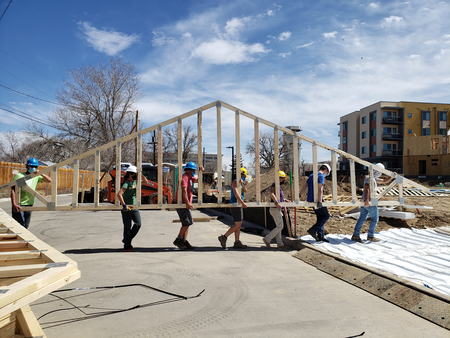
Neighborhood Development Collaborative

Audio By Carbonatix
Have you ever walked across vacant, hot parking lots, wondering why we weren’t using the valuable land in our city for something better? Or considered why empty, developable land – so rare in Denver – sits unused in a city with a housing shortage of 18,910 homes and an affordability crisis?
This is because since the 1950s, cities across the U.S. have required developers to build a certain number of parking spaces per home or business. These parking minimums are often calculated with arbitrary formulas that don’t accurately capture car ownership rates, connectivity to transit, or underutilized nearby parking.
All this extra parking makes housing in our city more expensive. Each spot adds up to $50,000 to each home’s purchase price or $200-to-300 per month to rents, and restricts the amount of housing that can be built in cities – increasing competition among buyers and renters, which further drives up housing costs.
Two recent studies show just how much extra parking Denver homebuilders are forced to provide as a result. An RTD study found that 40 percent of parking spaces at market-rate housing and 50 percent of spaces at affordable housing near transit went unused at peak times. Another study by Shopworks Architecture found that residents of housing affordable to very low-income households used only 9 percent of the available parking.
Happily, Denver City Councilmembers Sarah Parady, Chris Hinds, Flor Alvidrez and Darrell Watson are working with three city departments to modernize Denver’s parking policies. They propose letting homebuilders and local businesses build the amount of parking they need rather than an arbitrary amount rigidly predetermined by an archaic zoning code. This reform would help lower rents and home prices in an era of high building material costs and exorbitant interest rates.
This initiative continues Denver’s forward-thinking efforts to modernize its planning and development policies. Following the RTD and Shopworks Studies, Denver City Council adjusted the zoning code to lower the amount of parking required for homes affordable to households earning less than 60 percent of Denver’s median income, which is $78,000 for a family of four.
However, those reforms don’t go far enough. Other affordable homebuilders like Elevation Community Land Trust and Habitat for Humanity, which sell homes to households earning up to 80 percent of the area median income, do not benefit from those changes. Along with market-rate housing near transit, they do not need the amount of parking the code still requires them to build.
Even without minimum parking requirements, homebuilders and businesses still provide off-street parking. Developers know that most people own cars, and that parking availability matters when people choose where to live. To ensure that newly built homes attract tenants or buyers, the banks that finance construction actually require their clients to build sufficient parking. In fact, builders are still including garages and strategically-sized surface lots in their developments in several neighborhoods in and around Denver’s downtown – without the code requiring them to build any at all. Eliminating parking minimums does not restrict the amount of parking a builder can provide; rather, it allows them to decide for themselves how much parking is appropriate for each new project.
As the cost of car ownership rises and Denver densifies, our shared future lies in affordable neighborhoods with diverse transportation options. Rigid parking minimums don’t allow for that kind of flexibility, forcing those who own fewer cars or live car-free to subsidize parking spaces they don’t use through higher rents or home purchase prices.
Denver’s Planning Commission unanimously supports the proposal, as do 78 percent of the more than 300 public commenters at the planning commission hearing. However, city council will ultimately determine whether, or to what extent, we modernize our parking requirements. While making Denver truly affordable will require significant financial investments, especially for very low-income housing, the common sense reform of eliminating parking minimums can make a big difference in the meantime.
Lukas Hagen is the policy and research manager for the Neighborhood Development Collaborative.
On weekends, Westword.com publishes commentaries on matters of interest to the community; the opinions are those of the authors, not Westword. Have one you’d like to submit? Send it to editorial@westword.com, where you can also comment on this piece.